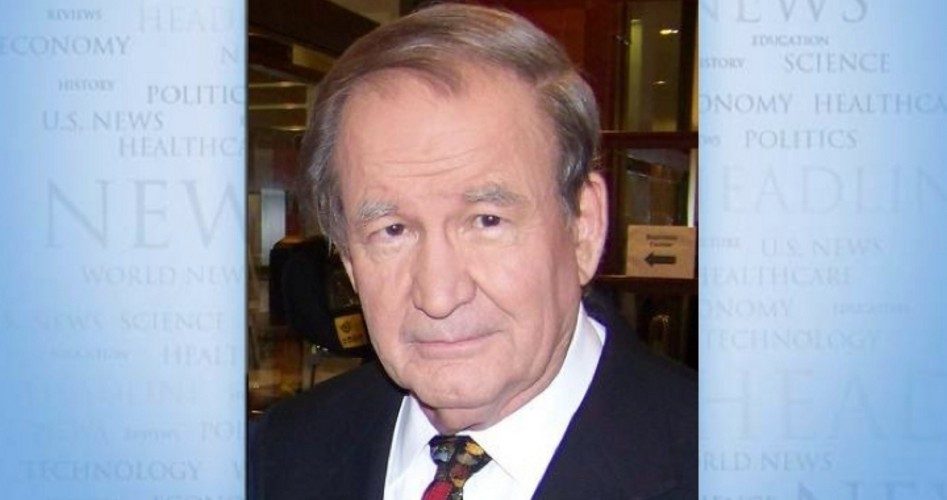
Asked what he did during the French Revolution, Abbe Sieyes replied, “I survived.”
Donald Trump can make the same boast.
No other political figure has so dominated our discourse. And none, not Joe McCarthy in his heyday in the early ’50s, nor Richard Nixon in Watergate, received such intensive and intemperate coverage and commentary as has our 45th president.
Whatever one may think of Trump, he is a leader and a fighter, not a quitter. How many politicians could have sustained the beatings Trump has taken, and remained as cocky and confident?
And looking back on what may fairly be called The Year of Trump, his achievements have surprised even some of his enemies.
With the U.S. military given a freer hand by Trump, a U.S.-led coalition helped expel ISIS from its twin capitals of Raqqa in Syria and Mosul in Iraq, driving it back into a desert enclave on the Iraq-Syria border. The caliphate is dead, and the caliph nowhere to be found.
The economy, with the boot of Barack Obama off its neck, has been growing at 3 percent. The stock market has soared to record highs. Unemployment is down to 4 percent. And Trump and Congress just passed the largest tax cut since Ronald Reagan.
With deregulation, which conservative Republicans preached to deaf ears in the Bush I and Bush II eras, Trump and those he has put into positions of power have exceeded expectations.
Pipelines Obama blocked have been approved. Alaska’s National Wildlife Refuge has been opened to exploratory drilling. We have exited a Paris climate accord that favored China over the U.S.
Though Beijing’s trade surplus with us is returning to record highs, a spirit of “America First” economic nationalism is pervasive among U.S. trade negotiators.
The one justice named to the Supreme Court, Neil Gorsuch, appears in the Antonin Scalia tradition. And under Chairman Chuck Grassley, the Senate judiciary committee is moving conservatives and strict constructionists onto U.S. appellate and district courts.
Politically, however, the year brought bad news, with portents of worse to come. In November, the Republican Party was thrashed in Virginia, losing all state offices, and then lost a Senate seat in Alabama.
Given polls showing Trump under water and the GOP running 10 points behind the Democratic Party in favorability, there is a possibility the GOP could lose the House in 2018.
And though Democrats have three times as many seats at risk in 2018, the GOP losing the Senate is not beyond the realm of possibility.
Should that happen, the conservative dream of a recapture of the U.S. Supreme Court could swiftly vanish.
Recall: Democratic Senates turned down two Nixon nominees and Reagan’s nomination of Robert Bork, forcing both presidents to name justices who evolved into moderates and liberals on the high court.
But it is in the realm of foreign policy where the real perils seem to lie. President Trump has been persuaded by his national security team to send Javelin anti-tank missiles to Ukraine, for use against the tanks and armor of pro-Russian rebels in Donetsk and Luhansk.
Should Petro Poroshenko’s Kiev regime reignite the war in his breakaway provinces bordering Russia, Vladimir Putin is less likely to let him crush the rebels than to intervene with superior forces and rout the Ukrainian army.
Trump’s choice then? Accept defeat and humiliation for our “ally” — or escalate and widen the conflict with Russia.
Putin’s interest in the Donbass, a part of the Russian Empire and the Soviet Union for centuries, is obvious.
What, exactly, is ours — to justify a showdown with Moscow?
In this city there is also a powerful propaganda push to have this country tear up the nuclear deal John Kerry negotiated with Iran, and confront the Iranians in Syria, Iraq, Yemen and the Persian Gulf.
But how much backing would Trump have for another U.S. war in that blood-soaked region, after Afghanistan, Iraq, Libya and Syria?
Who would stand with us, and for how long?
When Trump declared Jerusalem to be the capital of Israel and pledged to move our embassy there, we had to veto a unanimous U.N. Security Council resolution condemning us. Then the General Assembly denounced the U.S. in a resolution supported by all our key NATO allies, Russia and China, and every Arab and Muslim nation.
A day later, Trump complained on Twitter that we have “foolishly spent $7 trillion in the Middle East.”
What then would justify a new $1 or $2 trillion war with the largest nation on the Persian Gulf, which could send oil to $200 a barrel and sink the global economy?
Cui bono? For whose benefit all these wars?
The Korean War finished Truman. Vietnam finished LBJ. Reagan said putting Marines into Lebanon was his worst mistake. Iraq cost Bush II both houses of Congress and his party the presidency in 2008.
Should Trump become a war president, he’ll likely become a one-term president.
Photo of Patrick J. Buchanan: By Bbsrock – Own work, CC BY-SA 3.0
Patrick J. Buchanan is the author of a new book, Nixon’s White House Wars: The Battles That Made and Broke a President and Divided America Forever. To find out more about Patrick Buchanan and read features by other Creators writers and cartoonists, visit the Creators website at www.creators.com.
COPYRIGHT 2017 CREATORS.COM



